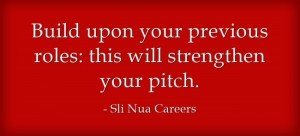By Liam Horan, Public Speaking & Presentations Trainer, Sli Nua Careers
Q. I have been working for 20 years as an office administrator and have recently qualified

to be a teacher. I am now going for my first interview and I am very nervous as I feel I will be older than the other candidates, and I need to convince the interviewer about my change of direction. Any pointers?
Changing career direction is now becoming a more common phenomenon due to people being faced with redundancy and forced to consider new options. This can present a new opportunity for individuals who have not been happy in their career to date. It can represent a new beginning in your career regardless of your age.

The workplace has changed considerably in the last 50 years where people often worked in the same job from school-leaving age right up to retirement. Now, many people can have three or four different types of ‘careers’ in their lifetime.
Making a transition into a new industry can be eased by gaining voluntary experience in your required new role. This not only gives you a taste of your new career but looks a lot more impressive on your CV. From the interviewer’s point of view, this is challenging as employers do not want to take a risk with individuals who do not have the required experience.
The more knowledge you have with regards to your role, the more sought after you will be. Every organisation wants a good employee, so a company might hire you based on the fact that you have more knowledge in certain areas that most others don’t. Knowledge in your required industry is very powerful.
Refer to your transferable skills from your previous role. Organisation and presentation skills are vitally important in a teaching role. A big many people make is that they try to ‘ignore’ their previous experience and make a fresh new start.
Build upon your previous roles: this will strengthen your pitch.
It can help to prepare key statements such as: “I have been working in an office for a number of years and although this was a very enjoyable career, I was often told my strengths were communicating with individuals and liaising with the clients. In the last three years, I have been involved in voluntary work with some local schools and after-school care. I feel my years of experience in office will add to the role, as they have given me an excellent foundation on how to organise and prioritise my work load efficiently. I also believe that I will bring maturity to the role and this is vitally important in this type of industry”
Avoid saying such as ‘I was never happy in my previous career’, as it comes across negatively in interview.
Colin Weatherspoon, chief executive of Cobweb Information, a research house that provides information for start-ups and business advisers, said there was a pattern to the types of firms begun by more mature business people.
“Experienced people tend to start up businesses that are less risky,” he said. “They are not high-growth businesses or trendy businesses. They are what they know, what they are good at, what they are experienced at, and they start businesses in which they can use the experience they have acquired.”
Weatherspoon said that the opportunities for older people to start up businesses based on giving advice and providing knowledge – such as financial consultancy, writing and editing, teaching and tutoring – were growing. “There is a market out there for experience,” he said
Public Speaking & Presentations Masterclass (Open) programme.
Need our help? Complete this form below and we will get back to you
[contact-form-7 id=”15430″ title=”Career & Personal Development”]